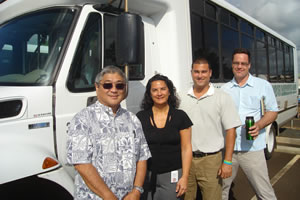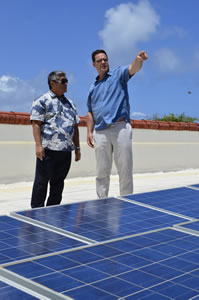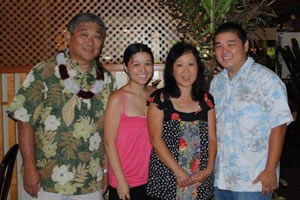It’s Electric!

Thanks to new county sustainability manager Glenn Sato (left), Kaua’i has received five electric vehicles and 10 charging stations, such as this one, free of charge (five stations are for public use). Sato and Ben Sullivan, county energy coordinator, are teaming to make the Garden Isle 100 percent energy self-sufficient by 2030. Coco ZIckos photo
“It’s as ambitious as it can be,” says Sullivan, the county’s energy coordinator. “It’s a great goal. It’s going to take a lot of work by everybody and a great coming together as a team.”
Teamwork is still in the works, but the ambition is already apparent.
Sato, whose new position as the county’s sustainability manager was revolutionized last year, is responsible for Kaua’i being the only island to receive a grant for five Nissan Leaf electric vehicles and 10 charging stations – five for the county and five for public use.
“You have to take the opportunity when it pops up. If you have the drive and ambition to do it, you succeed a lot of times,” says Sato, adding that the grant was available to all of the state’s counties.
The purpose of obtaining the cars is to be one step closer to lowering the island’s fossil fuel consumption.
Cars powered entirely by batteries do not burn fossil fuels and they use half as much oil as combustion engine vehicles, says Sullivan, who cringes when he hears arguments against them. So rather than 98 percent of money leaving on a barge, 50 percent still remains on island.
“There are really no legitimate arguments against electric vehicles,” he says.And while the charging stations are currently connected to the grid, it will only be a matter of time before they are powered by renewable energy sources like the sun.
Sato has been instrumental in launching many other energy initiatives, including the Kaua’i bus system in the 1990s. At the time, Sato was serving in Sullivan’s current role as the county’s energy coordinator. The job allowed him to obtain funding for the park-and-ride project.
He recalls serving Lappert’s ice cream and coffee from home to the station in a thermos, to help encourage customers to ride.
“Once you start riding the bus, it’s a more enjoyable option – it really is. Your only obligation is to sit down and be comfortable,” says Sullivan, who is a bus-riding advocate and uses it as a personal mode of transportation to and from work every day.
Though Sato now works under a broader umbrella of sustainability that encompasses areas beyond energy, such as agriculture and tourism, he spends a lot of time with Sullivan on renewable-energy projects. One of the main goals the duo is striving to achieve is reducing the county’s dependence on oil.
Setting up an 85-kilowatt photovoltaic system on top of Lihu’e Civic Center recently is an example of their steps in the right direction.“We are confident we can reduce our energy use by at least 20 percent in the next few years across the county,” says Sullivan.
They also are affiliated with several governmental programs such as the Better Buildings Challenge powered by the Department of Education, which asks partners to commit to 20 percent energy reduction by 2020, as well as the county’s Green Team and the Kaua’i Energy Sustainability Plan.
Currently, they are in the process of collecting data from across the county to help develop a sustainability program. It is no easy feat collecting years of electricity and fuel-use data from every department, including police and fire, to develop a carbon footprint baseline. Once that has been achieved, steps to lower the footprint can begin.
“What we’re doing, just for county government, is basically helping everybody,” says Sato. “Whatever we do to increase efficiency and lower operational costs, it helps every taxpayer on this island.”
Strengthening the county’s partnership with Kaua’i Island Utility Cooperative also is fundamental to that effort, according Sullivan, who served on the organization’s board before accepting his current position in December 2011.
“Everybody’s really coming together to solve the problem – and it’s a massive, massive problem,” says Sullivan, regarding the island’s dependence on foreign oil.
Though he spent much of his three years on KIUC’s board in the minority as far as votes were concerned, the experience taught him a great deal.“The co-op structure is ideal, but it takes coming together of the utility and community to realize what that fully means. It’s not an easy thing – utility issues are inherently complicated,” says Sullivan, who wants to place renewable energy systems across the island wherever they are feasible. “People tend to want simple solutions, but really, the solutions are not all that simple.”
Both Sullivan and Sato have tried to implement environmental solutions that work for everyone and have pushed the environmental envelope since early on in life.
They each were inherently connected to nature as children. Sato grew up in Hilo, spending much of his time shoreline fishing and diving, while Sullivan was raised in the small town of Sterling, Mass.
“I was lucky, actually, a lot of people think of Massachusetts as pretty developed, but behind my house there were several miles of an undeveloped river that I used to cruise on as a kid, so it was kind of like a Huck Finn childhood,” says Sullivan.
Sullivan’s career working with nature began soon after majoring in environmental design, akin to architecture, at the University of Colorado, and Sato’s pursuits started around the same time after obtaining a degree in biology from the University of Hawai’i.

Sato and Sullivan with Celia Mahikoa, executive on transportation, and Jeremy Lee, program specialist III, with a county bus
“That farm gave me a lot of the background for my being in the energy position,” says Sato, whose favorite hobby is crafting toy banks from discarded wood for keiki.
Sato eventually landed the energy coordinator position, which is a part of the county’s Office of Economic Development, in 1989. Aside from serving as the office’s director for a brief period of time, Sato remained as energy coordinator until last year, when he was promoted to the newly created position of sustainability manager.
Sullivan, whose family moved to Kaua’i after he graduated high school, eventually joined them on the island in early 2000. He established his own architectural business, where he tried to encourage more green building practices. In 2005, Sullivan also was instrumental in founding the renewable energy organization Apollo Kaua’i. At the time, there was a growing concern about energy costs, which led to the group’s establishment.
“People were waking up to climate change,” says Sullivan, who still tries to be as much a part of energy advocacy as he can.
Sullivan, who with wife Traci has three children – Emily (11), Luke (9) and Nate (7) – realized the energy burden the world was about to leave the next generation.

Sato and Sullivan atop the county civic building discussing ways to improve the government’s energy usage and maintain the photovoltaic system recently installed
Sato, husband of KIUC customer service employee Diane, with whom he has two grown children – Kristi, King Kaumuali’i Elementary School counselor, and Scott, Council Services legislative assistant – hopes to really embrace his new position and forge ahead in the sustainable energy movement with Sullivan.
“This is such a critical issue for the world,” says Sullivan.






